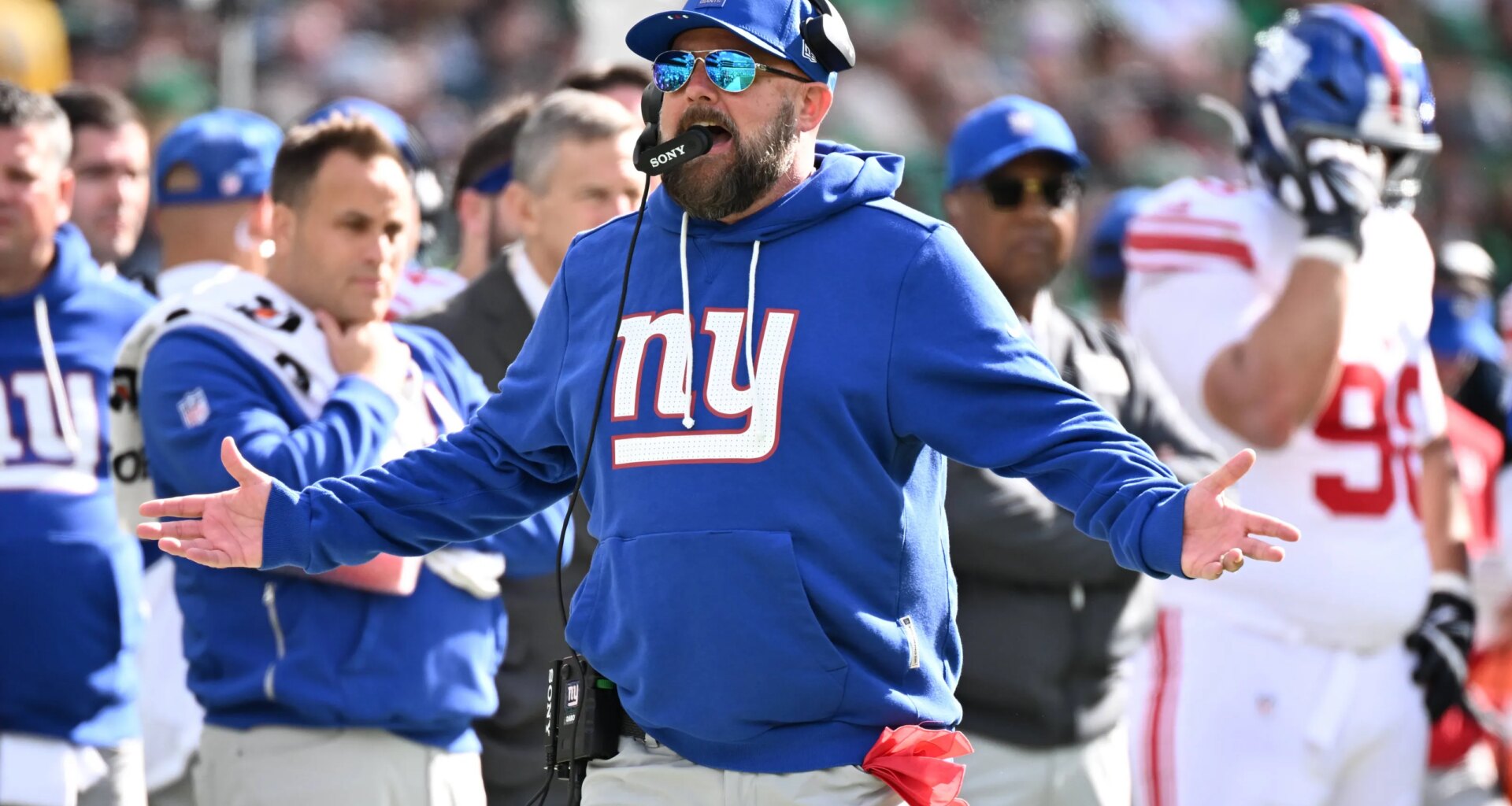The New York Giants fell to the Philadelphia Eagles, 38-20, on Sunday afternoon in one of the most egregiously officiated NFL games you’ll ever witness.
In total, the Giants were penalized seven times for 54 yards, but those numbers fail to detail exactly how one-sided and erroneous the calls were. It also doesn’t touch on some of the blatant misses made by the referees in Week 8.
“I’m not going to comment on what I think on officials,” head coach Brian Daboll said after the game. “They call it, and we got to play it.”
Although Daboll was subdued in defeat, he was quite a bit more animated on the sideline.
The anger was justified. Not just because of that one call, but because of the many leading up to that moment.
Need a news break? Check out the all new PLAY hub with puzzles, games and more!
Here’s a look and breakdown of Sunday’s officiating, which is likely to result in apology letters from the NFL.
The “Tush Push”
In Week 6, the Eagles ran four consecutive “tush push” plays against the Giants, and on at least two of those snaps, the replay showed a false start. Neither was called.
On a third “tush push” snap, Eagles quarterback Jalen Hurts was permitted to extend the ball over the goal line for a touchdown. That may have seemed irrelevant at the time, but it came into play on Sunday.
Fast forward to Week 8 and, apparently, the “tush push” rules had once again changed. This time, on a fourth-and-1 early in the second quarter, Hurts was no longer permitted to extend the ball because, unlike the touchdown in Week 6, this one ended in a fumble recovered by the Giants.
Not only was Hurts actively moving forward when stripped of the ball by Giants linebacker Kayvon Thibodeaux, but the whistle had not blown.
Thibodeaux stripped Hurts of the ball at 12:55 on the game clock. The officials blew their whistles as the clock went from 12:53 to 12:52. That’s two-and-a-half seconds of active play.
That’s notable because after the Giants protested and challenged (failed), the next offensive play was run at 12:23 on the game clock. Officials allowed the clock to continue running and never added those two seconds back following the timeout.
Additionally, when play did resume, officials spotted the ball at the Giants’ nine-and-a-half-yard line. To the inch, that’s where Thibodeaux stripped the ball from Hurts. If the ruling was that Hurts’ forward progress had stopped, it should have resulted in a measurement at the 10-yard line.
“Called forward progress. Sounds like some bulls–t to me,” Thibodeaux said after the game.
Instead of a turnover, the Eagles were gifted a first-down and punched it into the endzone two plays later.
Bad call result: Eagles +1 yard, +7 points
Thibs victimized again
With under 30 seconds remaining in the first half, the Eagles lined up for a second-and-7 from the Giants’ 11-yard line. Whistles blew the play dead pre-snap, and Thibodeaux was called for a neutral zone infraction.
At the moment of the whistles, Giants defenders quickly pointed to Eagles left tackle Jordan Mailata, suggesting he was the guilty party. And while five yards were walked off in Philly’s favor, replay once again told the story.
Very clearly, it was a false start. A 10-yard swing in favor of the Eagles (from -5 to +5).
On the very next play, the Eagles scored a touchdown and took a 21-10 lead into halftime.
Bad call result: Eagles +10 net yards
Korie Black DPI
With 9:26 remaining in the third quarter and the Eagles facing a third-and-11, quarterback Jalen Hurts threw an incomplete pass to Darius Cooper. Instead of punting, Philly was given renewed life when officials called rookie cornerback Korie Black for defensive pass interference.
The two players were hand-fighting, and Cooper appeared to throw Black up the field on the replay. It could be argued that Black grabbed Cooper’s jersey after being thrown, but that will come into play later.
Instead of punting or attempting a near 60-yard field goal, which Jake Elliott missed earlier in the game, the Eagles were gifted a free first down. They ended up connecting on a much easier 40-yard field goal to end the drive.
Bad call result: Eagles +14 yards, +3 points
Darius Slayton OPI
If one wants to argue that the Korie Black DPI was the correct call, then they must apply the same logic to the following play.
Facing a fourth-and-11 with 9:46 remaining in the game, Giants rookie quarterback Jaxson Dart connected with wide receiver Darius Slayton for a 68-yard touchdown. However, referees again blew their whistles, this time penalizing Slayton for offensive pass interference.
Similar to Black-Cooper, there was hand-fighting happening on this play.
An alternate angle of the play shows Eagles cornerback Quinyon Mitchell clearly holding Slayton’s wrist down as the Giants’ receiver struggles to break free.
If the Black play was DPI, then this, too, should have been DPI. It would have been declined, and the Giants awarded a touchdown.
And if that weren’t DPI, then perhaps holding Slayton’s jersey/shirt when he broke away should have been?
Instead, the Giants punted the ball away.
Bad call result: Giants -78 net yards, -7 points
Phantom Wan’Dale Robinson block
Another play in the second quarter is worth reviewing.
With the Giants facing a second-and-7 from near midfield, running back Tyrone Tracy Jr. carried the ball off the left guard for six yards, setting up a manageable third-and-1.
Instead, officials again blew their whistles and penalized wide receiver Wan’Dale Robinson for an illegal block in the back.
Eagles safety Andrew Mukuba was already diving in for the tackle as Robinson lightly grazed his back. It did not propel the safety forward any more than his momentum was already carrying him. The contact was light as a feather.
Instead of third-and-1, the Giants were penalized 10 yards, resulting in a net loss of 16 yards. They eventually punted the ball away.
Bad call result: Giants -16 net yards
Final tally
There were other bad or missed calls throughout the game, but these had the greatest impact. In total, the Eagles were gifted +25 net yards and +10 points, while the Giants were crippled by -84 net yards and -7 points.
Had the calls on the field been correct throughout the game, the Slayton touchdown would have pulled the score to 21-19 Eagles, with a two-point attempt likely with 9:46 remaining in the game.
But that is not how the cookie crumbled, and the Giants have every right to be furious about that.



